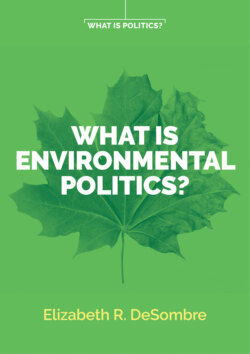What is Environmental Politics?

Реклама. ООО «ЛитРес», ИНН: 7719571260.
Оглавление
Elizabeth R. DeSombre. What is Environmental Politics?
CONTENTS
List of Illustrations
List of Tables
Guide
Pages
What is Environmental Politics?
Acknowledgements
CHAPTER 1 Defining Environmental Politics
What is the Environment?
What’s Special about the Environment?
Externalities
Collective Action Problems
Common Pool Resources
Time and Distance
Non-linearities/Tipping Points
What is Politics?
Notes
CHAPTER 2 Uncertainty and Science
Uncertainty and the Environment
Risk and the Environment
Scientists as Influencers of Policy
The Relationship between Science and Politics
Scientific Advice Meets Politics
The Special Case of Climate Change Denial
Science and Social Decisions
Conclusion
Notes
CHAPTER 3 Political Structures
The Role of Democracy
A Detour into Authoritarianism
Mechanisms for Democracy’s Environmental Influence
The Relationship between Democracy and the Environment
Democratic Transitions
Imperfections in Democracy
Corruption
Inequality
Environmental Injustice
Types of Electoral Systems
Federalism
Parliamentary versus Presidential Systems
Types of Parliamentary Systems
State Capacity
Conclusion
Notes
CHAPTER 4 Political Actors
Politicians
Political Parties
Bureaucracies
The Judiciary
Environmental Interest Groups
Business and Industry
Business–Environment Coalitions
Media
Conclusion
Notes
CHAPTER 5 International Environmental Politics
The Framework for International Environmental Politics
How International Environmental Cooperation Happens: Ozone Depletion as an Example
Characteristics of International Environmental Agreements
Non-State International Environmental Politics
Standards and Certification
Other Standards
Conclusion
Notes
CHAPTER 6 Engaging with Environmental Politics
Environmental Progress
Politics as the Reflection of Society
Alternatives to Environmental Politics?
A Defense of Environmental Politics
How to Protect the Environment, Politically
Remaining Questions
Conclusion
Notes
Selected Readings
Index. A
B
C
D
E
F
G
H
I
J
K
L
M
N
O
P
R
S
T
U
V
W
Z
POLITY END USER LICENSE AGREEMENT
Отрывок из книги
ELIZABETH R. DESOMBRE
I also benefit from being a part of the Environmental Studies Section of the International Studies Association, another set of scholars who both challenge and encourage each other. A related community is the Teaching Global Environmental Politics (GEP-ED) listserv, where queries about things such as environmental successes or publisher marketing surveys are quickly and helpfully answered, and I learn from listening to the various debates that others bring. I am not a natural networker, and the fact that people around the world who study and teach the kinds of things I do are people I want to hang out with makes our collective engagement much less instrumental and much more enjoyable.
.....
For businesses the logic is even clearer. Since it can be costly to internalize (or prevent) externalities, bearing that cost when you are not sure your competitors will do so is foolish. Until there is a regulation in place that requires everyone to make the change, being a free-rider on making environmentally beneficial change is likely to be good for business.
Ultimately the issue is that free-riders, or the possibility that there will be free-riders, can make cooperation to address collective action problems extremely difficult. Since anyone can benefit from being a free-rider in the face of successful collective action, fewer people participate in making environmental or political change than should – in other words, most people who want the change, and would benefit from it, don’t participate in helping to bring it about. And the fear that not enough people will participate can lead all but the most committed activists to give up on their efforts. After all, if you hold a political rally and only a few people show up, your efforts will be in vain. You receive what game theorists call the “sucker’s payoff” – you bear all of the costs and get none of the benefits.2 Being aware of that risk can make people less likely to participate in collective action.
.....